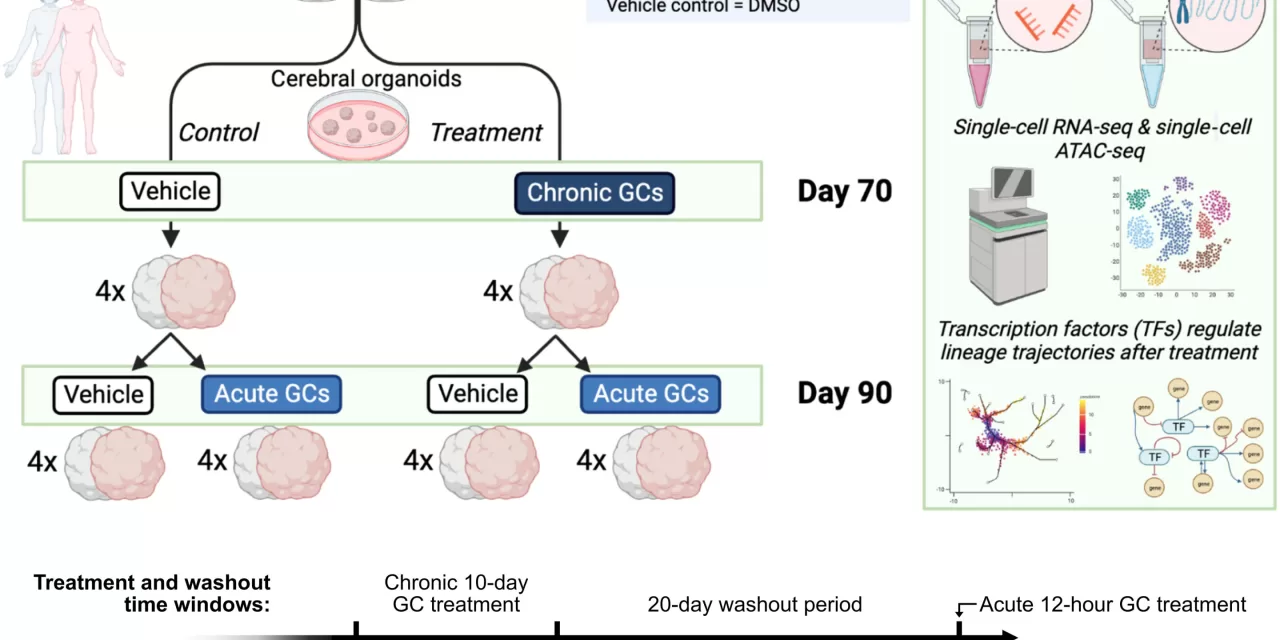New research reveals how stress hormones may alter brain development, potentially affecting mental health later in life.
In a groundbreaking study, researchers have uncovered how glucocorticoids, a class of steroid hormones, can impact the early stages of brain development. Their findings suggest that the developing brain is more susceptible to environmental influences—such as stress, infections, or chemicals—than previously understood. This research, published in Science Advances, could have important implications for understanding psychiatric and neurological disorders.
Glucocorticoids are crucial to the body’s natural stress response and play an essential role in fetal development. Synthetic glucocorticoids are often prescribed to pregnant women at risk of pre-term delivery, as they help promote lung development in premature infants. With approximately 13 million preterm births worldwide in 2020, these medications are widely used.
However, new evidence from a team led by Leander Dony and Elisabeth Binder at the Max Planck Institute of Psychiatry in Munich suggests that excessive exposure to glucocorticoids during early brain development may cause long-lasting changes in how the brain’s neurons are formed. Dony, along with colleagues from the Karolinska Institutet in Stockholm and Helmholtz Munich, tested this hypothesis using brain organoids—miniature models of the brain grown from human stem cells.
The research team exposed the brain organoids to synthetic glucocorticoids over an extended period, mimicking excessive exposure during early pregnancy. The results revealed a shift in the distribution of neuron types in the exposed organoids. Notably, there was an increase in inhibitory neurons and a decrease in excitatory neurons compared to control organoids. This shift could have significant implications for understanding how environmental factors affect brain development.
“These results show us that the human brain is very malleable and susceptible to external influences during the early stages of development, even more so than we previously thought,” Dony stated.
Excitatory neurons play a role in stimulating other neurons to fire, while inhibitory neurons act to slow down signaling between neurons. Imbalances between these neuron types have been linked to various psychiatric and neurological disorders, such as autism and schizophrenia. While previous studies have explored genetic factors in these disorders, this is the first study to demonstrate the impact of environmental factors like glucocorticoid exposure.
While the study raises important questions about disease risk, the researchers caution that more investigation is needed to determine whether an increase in inhibitory neurons signifies a higher risk or perhaps even resilience to certain disorders later in life. “We see an increased amount of inhibitory neurons, but our study results do not show us whether this means an increased risk or resilience to certain disorders,” said Cristiana Cruceanu of the Karolinska Institutet.
Brain organoids provide an invaluable tool for studying the complex processes that govern early brain development. Understanding how external factors like stress and medication affect the developing brain could lead to new approaches in preventing or treating psychiatric conditions.
The study is a vital step forward in our understanding of the link between environmental exposures and the development of mental health disorders. As more research is conducted, scientists hope to uncover ways to mitigate the risks associated with these early disruptions to brain development.
For further details, refer to the study: Chronic exposure to glucocorticoids amplifies inhibitory neuron cell fate during human neurodevelopment in organoids, Science Advances, 2025.
Disclaimer: The findings of this study are based on laboratory research using brain organoids. Further studies are needed to determine the full implications of these findings in human health and disease.












